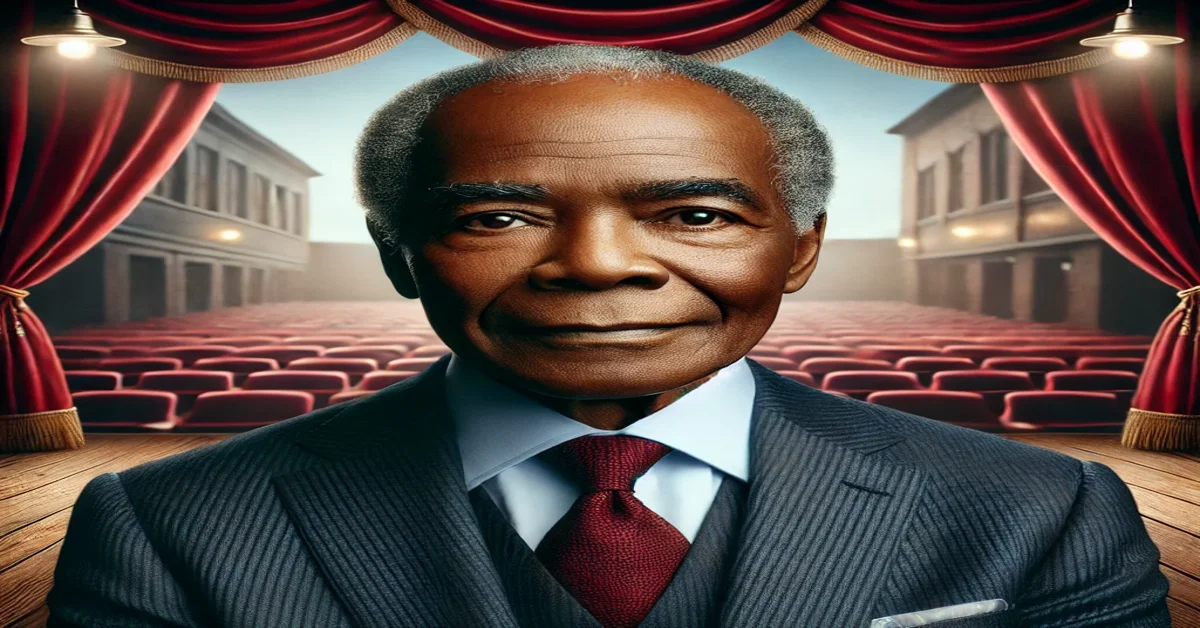Robert Earl Jones may not be a household name, but his contributions to the world of entertainment are both profound and enduring. Often overshadowed by his son, the legendary James Earl Jones, Robert carved out an impressive career in theater, film, and television that deserves recognition. This blog post takes you on a journey through the life of this remarkable artist—a man whose talent resonated on stage and screen alike.
From humble beginnings to becoming a prominent figure in American theater, Robert’s story is filled with passion and perseverance. His legacy continues to inspire those who follow in his footsteps. Join us as we explore Robert Earl Jones’ biography, personal life, theatrical achievements and memorable roles across various media platforms. Dive deep into the life of this unsung hero of American arts!
Biography
Robert Earl Jones was born on February 3, 1910, in Rufus, Oregon. His early life was marked by challenges and determination. Raised in a modest household, he developed a love for storytelling and performance at an early age.
After high school, Robert joined the United States Army during World War II. Robert Earl Jones military service shaped his character and provided him with experiences that would later influence his acting career. Upon returning home, he pursued his passion for the arts with unwavering resolve.
Jones began studying drama in New York City at the renowned School of Dramatic Arts. He quickly found himself immersed in the vibrant theater scene of the time. During this period, he honed his craft and connected with influential figures who recognized his talent.
His professional debut came soon after when he appeared on stage in various productions throughout New York’s Off-Broadway circuit. These performances showcased not only Robert’s skills but also laid the groundwork for future opportunities across different media platforms.
As time went on, Robert Earl Jones transitioned from theater to film and television roles that highlighted his versatility as an actor. Robert Earl Jones became known for both dramatic performances and lighter comedic roles alike—demonstrating that he could captivate audiences in any genre.
Throughout his life, Robert maintained a strong commitment to artistic expression while juggling personal responsibilities as a father to James Earl Jones—a legacy that continues through generations of performers inspired by their family’s rich history in entertainment.
READ MORE:Celebrity Movie Archives: Hidden Gems and Iconic Performance
Early Life
Robert Earl Jones was born on February 3, 1910, in Senatobia, Mississippi. Growing up in the small town of Greenwood influenced his early experiences and shaped his passion for performance. His family faced many challenges during this time, but they instilled a strong work ethic in Robert.
As a young boy, he found solace in storytelling and acting. This creative outlet provided an escape from the harsh realities of life. He often entertained friends and family with dramatic tales that showcased his flair for performance.
Jones moved to Chicago as a teen seeking greater opportunities. The vibrant arts scene there opened doors for him to explore music and theater more deeply. It was during these formative years that he honed his craft.
His exposure to diverse cultural influences fueled his ambition even further. He began performing at local theaters, where he quickly gained recognition for his talent. Each role brought him closer to realizing his dreams.
Despite facing racial barriers common at the time, Robert remained determined to succeed in show business. His perseverance laid the groundwork for what would become a remarkable career.
These early experiences not only shaped Robert Earl Jones’s artistic journey but also strengthened his resolve as an actor destined to make an impact on stage and screen alike.
Career
Robert Earl Jones had a diverse and compelling career that spanned several decades. He began his journey in the world of theatre, where he honed his craft. His early performances showcased an undeniable talent that would later translate seamlessly to film and television.
In the 1950s, Robert made significant strides on stage. He was part of various productions that earned him critical acclaim. The depth he brought to each role established him as a formidable presence in American theatre.
Transitioning from stage to screen, Robert found opportunities in film during the 1970s. His appearances in movies allowed him to reach wider audiences. Each performance reflected his ability to embody complex characters with ease.
Notably, Robert’s involvement in films like “The Sting” highlighted his versatility as an actor. His roles ranged from dramatic figures to comedic parts, demonstrating distinct range and skill throughout his body of work.
Television also welcomed Robert into its fold during this period. He appeared in popular series that captured viewers’ attention across generations. His memorable guest spots further solidified his status as a respected figure within the entertainment industry.
Throughout it all, Robert Earl Jones remained dedicated to perfecting his craft while inspiring younger talents along the way. This commitment has left an indelible mark on both theatrical and cinematic landscapes.
READ MORE:Brook B. Taube: Leadership and Philanthropic Insights
Personal Life
Robert Earl Jones led a life that was both vibrant and multifaceted. Born in 1910, he grew up in the heart of Mississippi. His formative years were marked by experiences that would shape his artistic sensibilities. The rich culture and deep-rooted traditions of the South influenced him profoundly.
He moved to New York City, where he found his passion for acting blossoming. However, it wasn’t just about performing; Robert had an insatiable thirst for knowledge. He immersed himself in literature and music, which added layers to his artistry.
Throughout his journey, family played a crucial role in Robert’s life. He had three children who often spoke fondly of their father’s guidance and support. His son, James Earl Jones, became one of the most celebrated actors of our time—a testament to Robert’s influence as a parent.
Despite achieving fame through theater and film, Robert remained grounded. He valued authenticity over public perception and chose projects that resonated with him personally rather than those merely designed for commercial success.
His relationships were also pivotal to his personal story. Friends described him as warm-hearted yet introspective—someone who could light up a room while contemplating life’s deeper meanings alone on stage or behind closed doors.
As he aged gracefully into retirement years, Robert continued sharing stories from his past with friends and family alike—a living archive filled with tales from Broadway stages to Hollywood sets.
Theatre
Robert Earl Jones made a significant mark in the world of theatre. His passion for acting was evident from an early age. He found solace and expression on stage, where he could fully immerse himself in various characters.
His theatrical journey began with performances in local productions. As he honed his craft, he gained recognition for his compelling presence and powerful voice. Audiences were captivated by his ability to convey deep emotions through subtle gestures and expressions.
One of the notable aspects of Jones’s career was his versatility. He effortlessly transitioned between dramatic roles and lighter comedic parts. This range allowed him to shine in diverse genres, showcasing his talent across multiple platforms.
Throughout his career, Robert appeared in several prestigious plays that left lasting impressions on audiences and critics alike. His dedication to the art form helped elevate African American representation within theatre during a time when opportunities were limited.
Jones also worked alongside many prominent figures in the industry, enriching not only his own experience but also contributing to collaborative projects that pushed artistic boundaries further than ever before.
The legacy of Robert Earl Jones continues to inspire aspiring actors today as they seek authenticity and depth similar to what he brought into every performance.
Filmography
Robert Earl Jones had a diverse and vibrant film career that spanned several decades. His journey in cinema began in the late 1940s, and he quickly made his mark with powerful performances.
One of his early notable roles was in “The Black Rose” (1950), where he showcased his talent alongside heavyweights like Tyrone Power. This film set the stage for more significant opportunities that would follow.
Jones became well-known for his work in films such as “The Great White Hope” (1970). He delivered an unforgettable performance, contributing to the movie’s critical acclaim and success at the box office. His portrayal resonated deeply with audiences.
He also appeared in classics like “The Sting” (1973) and “Bingo” (1991), further expanding his range as an actor. These films highlighted not just his acting prowess but also his ability to convey complex emotions through subtle nuances.
In addition to dramatic pieces, Robert Earl Jones embraced comedic roles, showcasing versatility across genres. His appearances added depth to many productions, creating memorable moments on screen.
Even later in life, he continued working steadily until retirement. Each role contributed to a rich tapestry of storytelling that marked a significant era of American cinema.
Television
Television played a significant role in showcasing Robert Earl Jones’s impressive range and talent. His appearances on various shows allowed him to connect with broader audiences, leaving an indelible mark on the small screen.
One of his notable television roles was in “The Defenders,” where he portrayed the character Ben Urich. His portrayal added depth to a series already rich in complex narratives and characters. He had a knack for bringing authenticity, enhancing each scene with his commanding presence.
Jones made guest appearances on popular shows during the 70s and 80s, including “The Twilight Zone” and “Roots.” These milestones not only solidified his reputation but also highlighted his versatility as an actor capable of tackling diverse genres.
His later work included voice acting, demonstrating that even as he aged, he continued contributing significantly to the industry through different mediums. The roles he chose often reflected strong moral values or showcased profound human experiences—elements that resonated deeply with viewers.
Through these performances, Robert Earl Jones became more than just an actor; he evolved into a cultural icon who left behind an enduring legacy in both theater and film. It’s this blend of talent and passion that has kept audiences captivated long after the final curtain call.
READ MORE:Teresa Fidalgo: Truth Behind the Viral Internet Legend









